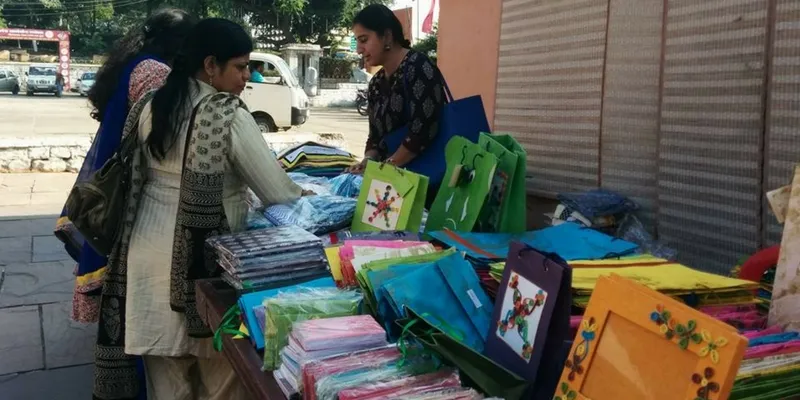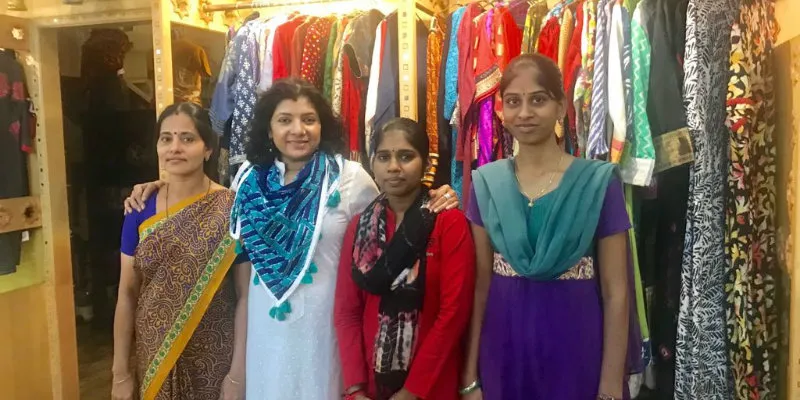Back to Skills – These startups lend a helping hand, skill youth for employment
Boosting the Government of India's vision of a “Kaushal Bharat, Kushal Bharat” (Skilled India, Prosperous India), many startups and organisations have set up skill training where the youth not only gain vocational training, but also employment opportunities.

The skill development and entrepreneurship efforts across the country have been highly fragmented so far. As opposed to developed countries, where the percentage of skilled workforce is between 60 percent and 90 percent of the total workforce, India records an abysmal 4.69 percent of workforce with formal vocational skills.
Realising the need to empower the youth and create a robust work force who is not only skilled to meet the needs of the industry, but also become financially independent and have a dignity of labour, the Ministry of Skill Development and Entrepreneurship, over the past four years, have started over 40 Skill Development Programmes (SDPs).
“In the last two years, we have operationalised 450 plus Pradhan Mantri Kaushal Kendras (PMKK), which are state-of-the-art infrastructure for skill training in the country. By the end of 2018, the country’s 700 districts will have a PMKK each with the help of industry, and our training partner ecosystem,” says Dharmendra Pradhan, Union Minister for Skill Development & Entrepreneurship (MSDE).
The ministry claims 2.5 Crore youth have been trained under Skill India in the past three years under its various programmes - 50 lakh candidates have been trained across the country thorough its flagship scheme Pradhan Mantri Kaushal Vikas Yojana (PMKVY); 9.33 lakh youth have been certified under the Recognition of Prior Learning (RPL) program, which recognises and certifies skills acquired through informal means in the unorganised sector; and over 3.95 lakh apprentices have been trained under the National Apprenticeship Promotion Scheme.
“We are also looking to create progressive pathways for the youth who are in our skill ecosystem, by ensuring they not only get skilled, but are hand-held and are further linked to entrepreneurship opportunities through Government of India’s MUDRA Yojana. Over the next one quarter (July, August, September), we aim to link one lakh skilled students to entrepreneurship,” he further added.
Boosting this vision of a “Kaushal Bharat, Kushal Bharat” (Skilled India, Prosperous India), many startups and organisations have set up skill training centres, where the youth not only gain vocational training, but also get employment opportunities.
YourStory lists a few such centres:
NABET India
Utilising the opportunities available in the IT and IT-enabled services, Nabet India [National Association for the Blind (Employment & Training)] has been instrumental in providing employment and livelihood to over 500 visually-challenged individuals.

Situated in Industrial Model Township in Manesar, Haryana, Nabet India was started by Usha and her husband, Commodore Sridhar Mishra, in 2011. They were supported by IT experts, who helped them develop courses that could enable the visually-impaired to get regular jobs.
With a dynamic course curriculum, the Nabet team constantly updated its content to meet specific industry demands. The training-cum-employment programme offers basic computer application. Specific courses are conducted to make the trainees job-ready.
Over the past six years, Nabet India has found employment to over 500 people. It has received various recognitions, including the Washington DC’s ‘Global Good Fund’ 2017, and London’s ‘Queen's Young Leader’, 2017 awards. The National University of Singapore and DBS Bank also listed it as one of the top 60 organisations in Asia.
LabourNet
Spearheading India’s self-employment and skill development movement is LabourNet, a social enterprise that believes in not just skilling, but the holistic generation of livelihood through education, employability and entrepreneurship.

Founded by Gayathri Vasudevan in 2006, LabourNet started out as an entity that augments the careers of labourers, by uniting those seeking jobs with companies and organisations. Hence, their initial model was linking the informal sector to jobs.
It was a little ahead of time, using call centre operations, where the labourers from rural areas as well as urban pockets would be connected in the network.
With a presence in over 28 sectors, its aim is to create social impact and add value to businesses across India through over 60 geographic clusters in 21 states.
Neev
Through Neev, rural women in Shivpuri, Madhya Pradesh, have a chance to hone their skills and earn a steady income.

The Neev Foundation aims to address poverty, illiteracy, and give opportunity to those affected, so they can lead a better life. Neev gets it funds from sale of products at exhibitions, online sales and the proceeds from the food they sell at the Happydays School’s canteen.
Their first project engaged women in making bags out of newspapers, which were sold in local stores in Shivpuri. Later, they were taught to make gift bags, photo frames, file folders, diaries and greeting cards. The women also learned how to sew clothes and make tablecloths, bed covers and cushion covers.
Currently, Neev is working with over 25-30 women from Thakarpura, Nohri, Kathmai and Binega villages in Shivpuri. These women represent a mix of married and single women.
UpSkill
UpSkill, founded in 2014 by Mansi Agarwal and Apar Kasliwal, provides underprivileged youth easy access to employment, linked to vocational training. Besides, the organisation has also been designing innovative training and placement models.

UpSkill’s mission is to not only provide jobs through skilling, but also to contribute to an individual’s career through a continuum of opportunities and growth.
UpSkill has two primary business verticals. The first one includes training centres that are operated under various government and CSR-funded projects, and a few that run on fee-based training programmes. The second is UpSkill’s technology platform NODE, which is a SaaS-based software. NODE captures data at all steps — from education to employment, from recruiting trainees to placement to career advancement. This platform is used by trainers and organisations, who wish to use their CSR fund on skill training, and industries who wish to hire skilled workforce.
UpSkill has, so far, been able to successfully place 3,400 youth from rural and urban slum areas into the organised sector. The average salary of the candidates has been Rs 7,800 per month, and the highest being Rs 18,000 per month.
Phamb
To help Kashmiri spinners and weavers preserve their art and provide employment to many, Junaid Shahdharm, in 2016, started Phambm — a pashmina fashion house that sells shawls, stoles, scarves, suits and other garments across India, USA, Dubai, Germany, France, and the UK.

Knowing that online businesses are independent of local business failure, strikes, and other bottlenecks, helped Junaid gather the support of his team members.
Phamb takes care of the production of the raw materials to the end fabric along with the distribution of the products. An eight member team purchase raw wool from Ladakh, and send it for combing, spinning, and weaving. The finished product, if required, is sent for embroidery and the final product is placed in the store and pictures are put up on the website.
Apart from online presence, Phamb has a brick-and-mortar store in Srinagar, and the fashion house employs more than 1,500 artisans. It has grown from selling pashmina shawls, stoles, scarves and other wraps to making customised men and women apparel, and has achieved a turnover of Rs 50 lakh.
Quest Alliance
Quest, an acronym for Quality Education and Skills Training, aims to enable individuals to build self-learning pathways in order to make meaning of their lives. With help from blended learning modules that holds a mix of digital and activity-based learning, they enable students to learn at their own pace.

Founded by Aakash Sethi in 2005, Quest Alliance has taken charge of bringing online technology to the fore and make learning playful and impactful, making it an enriching experience for both the learners and facilitators. Quest gives utmost importance to building a teacher’s capacity to make classrooms engaging, as it makes for empowered learners.
Through its myQuest programme, the organisation focuses on skills and career development for the youth, along with improving facilitation skills for trainers. MyQuest benefits youth between the ages of 17 and 30 in both rural and urban contexts, primarily from disadvantaged backgrounds, who are in urgent need of employment and skills.
Since 2009, this programme has trained 1,00,000 youth and engaged 2,000 trainers across 25 States with 18 team members.
Jullaaha
Jullaaha, founded by Jaya Devi, empowers women’s lives by training them in Batik and Kalamkari work, mural painting, block printing, embroidery and tailoring.

In 1993, a woman with limited means came to her for work. Jayadevi decided to teach her Batik, and this laid the foundation of a small enterprise that was set up on the rooftop of her house that would soon touch the lives of more than 45 families
Jaya Devi and Jullaaha are also involved with The Banyan, an institute for intellectually-challenged women, based in Chennai. Jullaaha trains women from The Banyan through a special unit set up for this purpose. Jullaaha is also a destination boutique in Chennai, well-known for its original handcrafted sarees using ancient decorative techniques. Its products are available online on its website as well as ecommerce websites like Amazon.




![[Techie Tuesdays] Santosh Rajan — the 56-year-old geek behind GeekSkool](https://images.yourstory.com/cs/wordpress/2017/01/Santosh-rajan-techie-tuesdays.jpg?mode=crop&crop=faces&ar=1%3A1&format=auto&w=1920&q=75)

